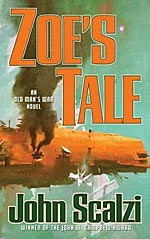
![]() verkisto
verkisto
7/26/2016
![]()
I'm not a huge fan of stories that re-tell other stories. There's a trend going on where modern writers re-tell fairy tales from a different perspective, with varying degrees of success ("Snow, Glass, Apples" is that sort of thing done right; Maleficent isn't), but when a writer re-tells one of his own stories? I'm a little cautious about that. It seems like it's more a cash-grab than an actual story-telling effort, and that's a large reason why I have no interest in reading Ender's Shadow or its sequels. I already know the story of Ender and Bean, so a lot of the tension will be removed from the story by the obvious reason that I already know how it ends.
Zoë's Tale isn't quite a straight retelling of Scalzi's The Lost Colony. This time around, we get to see more of what happens off-screen, and two of those things are a couple of the ZOMG biggest events in the story. Apparently Scalzi received enough fan mail complaining about two of the biggest plot points being dropped in without sufficient explanation, and figured that he had to go back and right that wrong, and since both events involved Zoë, writing this companion novel was his solution. It's not what I would have preferred.
This is also not to say that the book isn't worthwhile. Even knowing what was to come, I found myself enthralled with the story, partly because Scalzi is a worthy writer, and partly because Scalzi still managed to make it interesting. Despite having some new details, I noticed that Scalzi took on a whole new voice by writing from Zoë's perspective. I'm used to him writing about ass-kicking galactic soldiers, so it was a bit of a surprise to get a novel written from a seventeen year-old girl's perspective. But he did it. I mean, not being a seventeen year-old girl, I can't say that for certainty, but the voice was new, and convincing. How is that not successful?
Being a companion novel, though, means that Zoë's Tale isn't a standalone novel. Since Scalzi doesn't go back and rehash all the details that were already covered in The Last Colony, much of the detail from that book is glossed over here. So some of the problems that Scalzi wanted to correct by writing this book become problems here that require readers to go back and read The Last Colony. Is that good or bad? I honestly don't know. It just strikes me as being a little troublesome.
I don't know if I would consider this a necessary part of the Old Man's War series, but if you've come this far in the series, then you may as well read on and see how Scalzi resolves the loose ends from the previous novel. Aside from a huge omission that's present in both books, I doubt you would be disappointed.